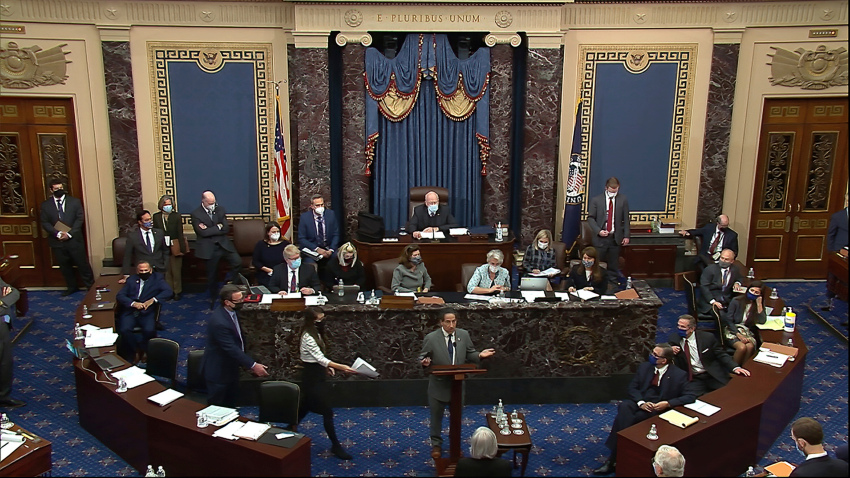On January 25, 2021, Clerk of the House Cheryl Johnson walked articles of impeachment to the U.S. Senate on grounds of Donald Trump committing high crimes and misdemeanors through inciting an insurrection.
This piece will not discuss whether or not Trump incited an insurrection, for I’m writing that in a previous piece.
This piece is concerned with the legality of the trial the Senate shall be conducting during the week of February 8.
The constitution is perfectly clear about the illegality of this trial, so let’s further explore why.
To begin with, it’s important to visit where the U.S. Constitution grants the Congress such power. Article II, Section 4 reads:
“The President, Vice President and all civil Officers of the United States, shall be removed from Office on Impeachment for, and Conviction of, Treason, Bribery, or other high Crimes and Misdemeanors.”
The Constitution grants the Congress power to remove officers of the United States through impeachment in the House of Representatives and conviction by means of a trial in the Senate, and is derived from English practice; however, not without important differences.
Impeachment in England could be against any individual and for any reason, with penalties ranging from paying fines to being executed.
Impeachment under the U.S. Constitution can only be against public officers (this is very important for this piece) and is not penal, but rather remedial.
There are only two “penalties” under impeachment in the United States laid out in Article I, Section 3, Clause 7 of the U.S. Constitution:
“Judgement in Cases of Impeachment shall not extend further than to removal from Office and disqualification to hold and enjoy any Office of honor…”
The purpose of impeachment, according to the U.S. Constitution, is for removal from office and disqualification from holding office again. Notice the wording here: and, not or.
The purpose of impeachment is not to disqualify a former office holder from ever holding office again.
The purpose is to remove them from office, with a subsidiary punishment of never holding office again.
With this in mind, let’s further explore the case of Donald Trump. As of 12:01 p.m., January 20, 2021, Donald Trump is a former President of the United States, and now a private citizen just like you and I.
In analysis of the U.S. Constitution, it’s clear that impeachment is for office holders and not private citizens. Some are saying there needs to be a trial because Section 3 of Amendment XIV keeps a person from holding office if they’ve engaged in insurrection.
They would be correct in what they claim the constitution states; however, their conclusion is entirely incorrect. Amendment XIV also states (Section 1) that no citizen shall be deprived of “life, liberty, or property without due process of law…” The Senate is not a judicial body, and thus trying a private citizen by means of the Congress deprives that citizen of due process and is unconstitutional.
It’s unconstitutional because it’s a bill of attainder, which is an act of legislature that declares a person guilty of crime, and is prohibited by Article I, Section 9, Clause 3 of the U.S. Constitution. Private citizens are tried by a court of law, not by the Congress or public opinion. This is a nation of laws, not of men.
In short, impeachment is solely for removal from office, with a secondary consequence of disqualification for holding office again, and Trump is no longer holding office, thus making him a private citizen who cannot be tried by the Congress.
I desire nothing more than to never see Donald Trump run again, but I refuse to stand for depriving a citizen of their natural right to due process. Luckily, the U.S. Constitution doesn’t stand for it either.
